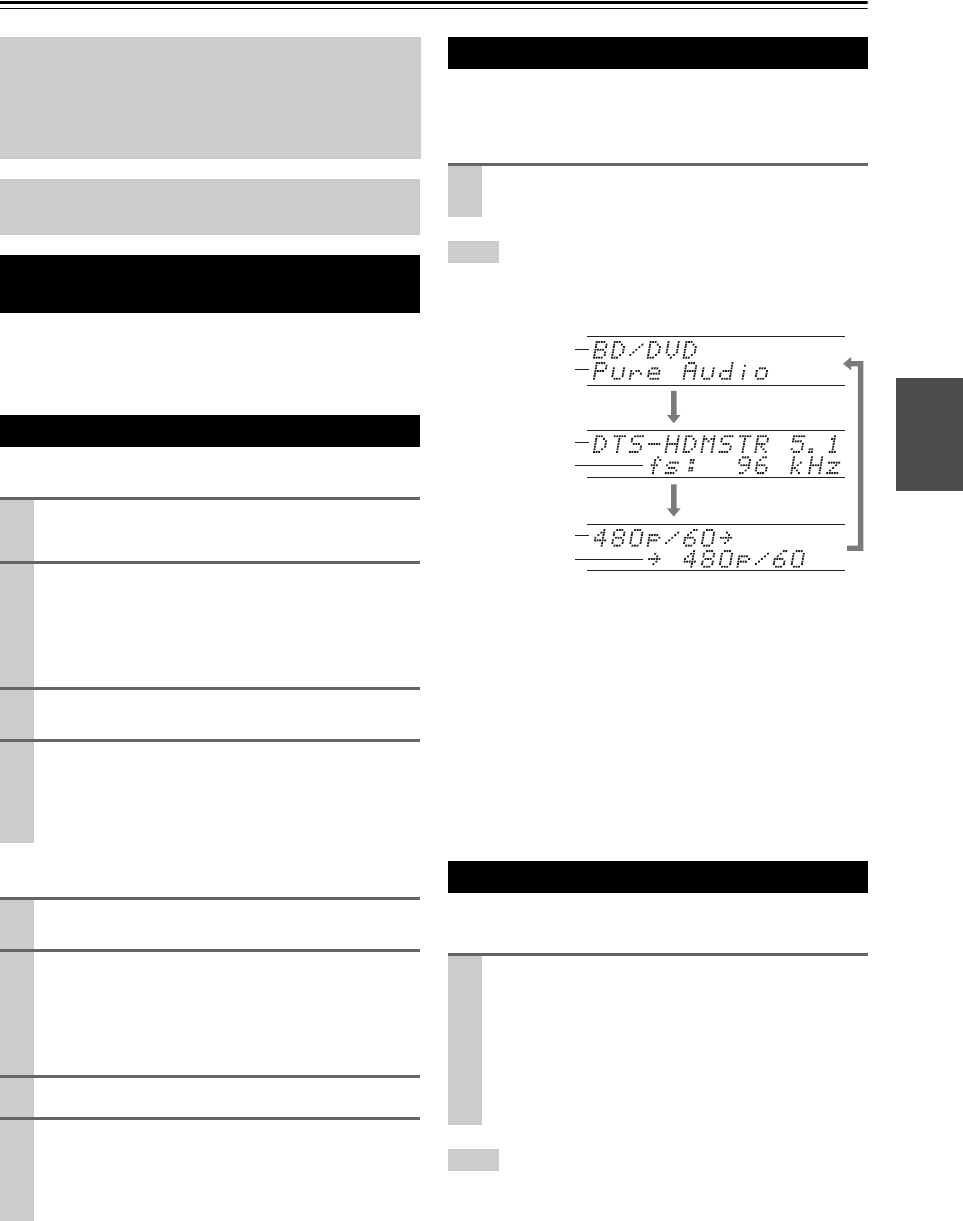
25
En
Basic Operations
You can determine the language used for the onscreen
setup menus. See “Language” in the “OSD Setup”
(➔ 53).
■ Operating on the AV receiver
■ Operating with the remote controller
You can display various information about the current
input source as follows. (Components connected to the
UNIVERSAL PORT jack are excluded.)
Tip
• Alternatively, you can use the AV receiver’s DISPLAY.
The following information can typically be displayed.
*1
The input source is displayed with the default name even
when you have entered a custom name in “Name Edit”
(➔ 50).
*2
If the input signal is analog, no format information is dis-
played. If the input signal is PCM, the sampling frequency is
displayed. If the input signal is digital but not PCM, the signal
format and the number of channels is displayed. For some dig-
ital input signals, including multichannel PCM, the signal for-
mat, number of channels, and sampling frequency is
displayed.
Information is displayed for about three seconds, then the pre-
viously displayed information reappears.
You can adjust the brightness of the AV receiver’s display.
Tip
• Alternatively, you can use the AV receiver’s DIMMER.
The on-screen setup menus appear only on a TV that
is connected to the HDMI OUT. If your TV is con-
nected to the MONITOR OUT V, MONITOR OUT S
or the COMPONENT VIDEO MONITOR OUT, use
the AV receiver’s display when changing settings.
This manual describes the procedure using the
remote controller unless otherwise specified.
Selecting the Language Used for the
Onscreen Setup Menus
Playing the Connected Component
1
Use the input selector buttons to select the input
source.
2
Start playback on the source component.
See also:
• “Controlling Other Components” (➔ 76)
• “Controlling iPod” (➔ 71)
• “Listening to the Radio” (➔ 32)
3
To adjust the volume, use the MASTER VOLUME
control.
4
Select a listening mode and enjoy!
See also:
• “Using the Listening Modes” (➔ 35)
• “Audyssey” (➔ 48)
1
Press RECEIVER followed by INPUT SELEC-
TOR.
2
Start playback on the source component.
See also:
• “Controlling Other Components” (➔ 76)
• “Controlling iPod” (➔ 71)
• “Listening to the Radio” (➔ 32)
3
To adjust the volume, use VOL / .
4
Select a listening mode and enjoy!
See also:
• “Using the Listening Modes” (➔ 35)
• “Audyssey” (➔ 48)
Displaying Source Information
Press RECEIVER followed by DISPLAY repeat-
edly to cycle through the available information.
Setting the Display Brightness
Press RECEIVER followed by DIMMER repeat-
edly to select:
• Normal + MASTER VOLUME indicator lights.
• Normal + MASTER VOLUME indicator goes off.
•Dim + MASTER VOLUME indicator goes off.
• Dimmer + MASTER VOLUME indicator goes
off.
Sampling
frequency
Input source
Signal format
*2
Input signal
resolution
Output
resolution
Listening
mode
*1
